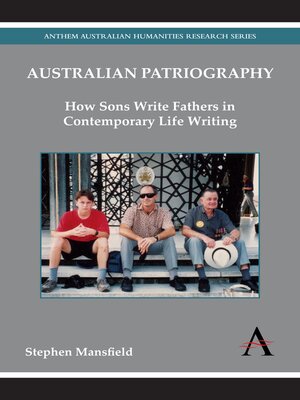Australian Patriography
ebook ∣ How Sons Write Fathers in Contemporary Life Writing · Anthem Australian Humanities Research Series
By Stephen Mansfield

Sign up to save your library
With an OverDrive account, you can save your favorite libraries for at-a-glance information about availability. Find out more about OverDrive accounts.
Find this title in Libby, the library reading app by OverDrive.



Search for a digital library with this title
Title found at these libraries:
| Library Name | Distance |
|---|---|
| Loading... |
The Son's Book of the Father, as Richard Freadman termed it, is a rich field of relational autobiography, offering a unique set of tensions and insights into modes of masculinity, notions of identity and the ethics of representing another's life in writing one's own.
This study of modern Australian life writing by sons who focus on fathers places an emerging sub-genre within its literary ancestry and its contemporary milieu. Providing compelling readings of Raimond Gaita's 'Romulus, My Father', Peter Rose's 'Rose Boys' and many others, this is the first study of its kind within Australian literature.
|This study discusses modern Australian life writing by sons who focus on their fathers. Termed patriography (by Couser) or The Son's Book of the Father (by Freadman), this rich field of relational autobiography offers insights into modes of masculinity, notions of identity and heritage and the ethics of representation. The current proliferation of 'father memoirs' in the marketplace demonstrates that such writing is fulfilling and being fuelled by the need to better understand the traditionally lesser-known parent.
Beginning with an analysis of the paradigmatic case of the sub-genre, Edmund Gosse's Victorian masterpiece 'Father and Son', the study moves quickly on to embrace its Australian literary frame, demonstrating Gosse's influence on a range of classic Australian autobiographies, including Hal Porter's 'The Watcher on the Cast-Iron Balcony'. Mansfield then offers five 'case studies' on the seminal works of the current era: Raimond Gaita's 'Romulus, My Father'; Richard Freadman's 'Shadow of Doubt'; Peter Rose's 'Rose Boys'; John Hughes's 'The Idea of Home'; and Robert Gray's 'The Land I Came Through Last'.
How do these authors 'perform' their masculinity in the act of writing the father? What are some of the ethical complexities that must be negotiated when representing the reticent-laconic in autobiography? And, ultimately, how does one decide what an ethical representation of the father is? These are some of the questions Mansfield addresses in 'Australian Patriography', the first study of its kind in Australian literature.







